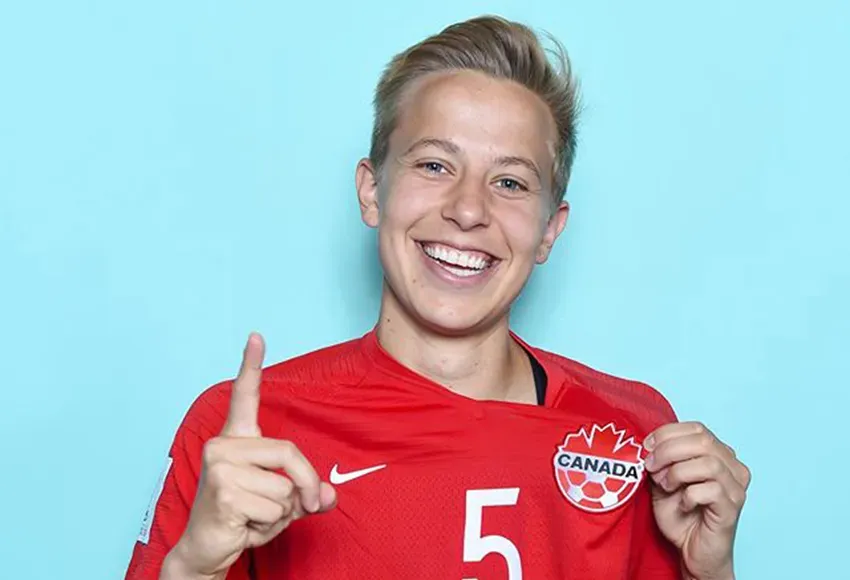The 2020 Olympic Games have been, without a doubt, the Gayest Olympics ever. With at least 180 LGBTQ athletes, the Queer community just keeps winning in Tokyo.
But one athlete in particular is taking the world by storm. Quinn, who only goes by one name – in the style of another soccer superstar, Pelé – has been gaining traction in the world of international soccer. Quinn, who is one of only three out Trans and/or nonbinary athletes in the Olympics, is competing on Canada's women's soccer team.
Tokyo is not Quinn's first Olympics. They competed in Rio in 2016, but this is their first Olympics since coming out as Trans/nonbinary to the public in September 2020. While Quinn had been out to their close friends and family, they decided to post on Instagram, because, as they said, "I want to be visible to queer folks who don't see people like them on their feed."
Following that, Quinn posted a casual shirtless photo in June 2021, showing off their top surgery. Because women's soccer was one of the first sports to begin playing this year (before the opening ceremony), Quinn also became the first openly Trans athlete in history to compete in the games, followed shortly after by Laurel Hubbard, a weightlifter from Australia; and American skateboarder Alana Smith.
Quinn's journey
Quinn's journey to becoming the most decorated Trans athlete in the 2020 Olympics started in 2016, when they decided to play with Canada in the Olympics (Quinn had previously played soccer in both Canada and the United States).
They attended Duke University while also competing in the 2016 Olympics, and after graduating, went on to play professional soccer for the United States Women's Soccer League. In 2018, Quinn was the highest drafted Canadian in the USWSL, having been chosen third in the draft by the Washington Spirit. In 2019, Quinn transferred to the Seattle Reign, where they would train and compete along with Queer soccer legend Megan Rapinoe.
While the Canadian women's soccer team left Rio with bronze in 2016, Quinn was determined to help lead their team to victory the next chance they got. They bid Seattle farewell, and headed to Toronto to train for Tokyo.
On Monday, August 2, 2021, Canada faced off against the United States, four-time gold medalists in women's soccer. The game was close, and after 75 minutes, the world was shocked to see Canadian player Jessie Fleming launch the ball into the back of the net after a penalty kick was awarded to Canada.
The win marked Canada's first victory against the United States since 2001, and landed Quinn and their team a spot in the final match against Sweden. The win also guarantees Quinn a medal – either gold or silver.
Trans and nonbinary athletes
Quinn has been open about the pride they feel, not only for representing Canada but Transgender and nonbinary athletes from around the world. "I feel proud seeing 'Quinn' up on the lineup and on my accreditation,' they said, '[but] I feel sad knowing there were Olympians before me unable to live their truth because of the world."
Quinn has been vocal about their support for Trans athletes, and was often seen wearing a "Protect Trans Kids" sweatshirt in Seattle Reign pre-game events.
While Quinn has been forging a path for future Trans athletes to be able to compete on the world stage, limitations on them are still in place. Since Olympic sports are gendered, the International Olympic Committee has set up specific restrictions on Trans and nonbinary athletes. Trans men are allowed to compete as men with no restrictions or setbacks, but to compete in any "women's sports," Trans people must provide evidence that their blood contains less than 10 nanomoles of testosterone per liter for at least 12 months prior to competition. This rule continues to stand, even though there is no proven scientific evidence that testosterone increases athletic ability.
In 2018, Namibian athlete Caster Semanya was banned from national competition because she had naturally higher levels of testosterone and refused to take drugs to reduce those levels.
This ban also means that many Trans athletes, like Quinn, are limited as to how much T they can take while undergoing transition, so athletes transitioning to female face even more challenges when it comes to balancing a healthy transition and monitoring body levels of testosterone, so as to make sure they can be eligible for international competition.
Despite all the challenges Quinn has faced to get to where they are today – including unfair and intrusive regulations regarding their body and testosterone levels, struggles with coming out on such a public stage, and of course competing against the United States women's soccer team – they are poised to possibly become the Olympics' first-ever Trans gold medalist.
The Olympic women's soccer final will be on Thursday August 5, 2021, at 7 p.m. Pacific time. No matter the outcome of the game, Quinn has made history, and will continue to inspire many young athletes both on and off the field.


